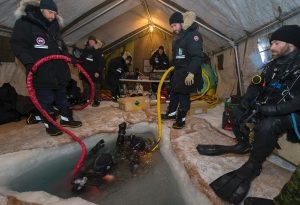Thousands of bear tags are sold each year in northwest Canada, so why are so few hunted?

Hundreds of Yukoners are buying seals every year allowing them to hunt bears when they have no intention of actually killing one.
A report issued last week by the territory’s Department of Environment details hunting patterns in the Yukon, in Canada’s northwest, over the past 35 years.
The number of seals sold for hunting grizzly and black bears, obtained by resident and non-resident licensed hunters, has more than doubled since the early 1980s.
For grizzlies it rose from around 600 to about 1,600 by 2014.
The number of grizzlies taken by hunters, however, has stayed relatively stable, at an average of 76 per year.
The number of seals for black bears rose from more than 1,000 in 1980 to more than 2,000 in 2014. The number of black bears killed by licensed hunters has been stable at an average 89 annually.
The cost for a black bear seal is $5 and for a grizzly, $25.

Rob Florkiewicz, the government’s harvest coordinator, said it’s something of a mystery.
“We’ve had that conversation through the grizzly bear management process, ‘why is that happening,’ there’s a why, and some of that is, we are aware that more people are purchasing seals not necessarily intending to hunt,” said Florkiewicz.
Paying to avoid problems
Christine Cleghorn, the director of the Fish and Wildlife branch said a survey in 2013 indicated that only 25 per cent of the people who purchased seals intended to hunt.
Most of those said they wanted the seal in case they came into conflict with a bear, but the officials couldn’t speculate on why that would that be necessary. Cleghorn said another survey of bear hunters will be done within a few years.
People don’t need a license or seal to kill a bear in defence of life.

The executive director of the Yukon Fish and Game Association Gord Zealand, said however, the steady increase in the number of bear seals purchased by Yukon hunters is a precautionary move. Hunters are “encouraged” to buy them because it’s the best way to avoid problems if they’re forced to kill a bear in self-defence, he said.
“It’s just trying to make sure that you don’t run into any issues with the Department of Environment,” he said.
“It’s just worth it rather than all the various requirements that you need to answer to and fill in if you run into the problem where you are charged by a bear,” said Zealand.
He said people are concerned something they say or do in that situation could inadvertently cause a conservation officer to doubt their account.
But Zealand said, issues like that are not common.
Related stories from around the North:
Canada: Communities in Canada’s east-Arctic say Inuit lives need to be protected over polar bear population, CBC News
Finland: Elk hunting season increasingly bringing hunters and joggers in same areas in Finland, Yle News
Norway: Could drones help prevent polar bear attacks on the Arctic archipelago of Svalbard?, The Independent Barents Observer
Russia: Polar bears greatly exposed to toxic chemicals in eastern Barents Sea, The Independent Barents Observer
Sweden: Hunters push to end Sweden’s ban on bow hunting, Radio Sweden
United States: After deadly bear attack, hikers in Anchorage, Alaska weigh risks, Alaska Public Media


